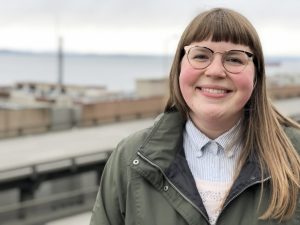AmeriCorps VISTA Member Laura Jenkins
 Laura Jenkins served as a Cities of Service Love Your Block AmeriCorps VISTA member in Seattle from February 2016 to February 2017. After her service in the Seattle Department of Neighborhoods ended, she was hired in that department as a Community Engagement Coordinator. The experience and relationships she gained in her VISTA role have proven vital in city hall.
Laura Jenkins served as a Cities of Service Love Your Block AmeriCorps VISTA member in Seattle from February 2016 to February 2017. After her service in the Seattle Department of Neighborhoods ended, she was hired in that department as a Community Engagement Coordinator. The experience and relationships she gained in her VISTA role have proven vital in city hall.
Can you give an overview of your experience as a Cities of Service AmeriCorps VISTA member?
While at the Seattle Department of Neighborhoods, another VISTA member and I coordinated neighborhood walks led by the mayor of the city called Find It, Fix It Community Walks. These walks provided a way for city officials to meet and hear from community members and also see what the real issues were. We also worked with community organizations to coordinate neighborhood projects in tandem with the walks, like clean-ups, plantings, or murals. This created an opportunity for the community to apply for funds to make small-scale improvements to their neighborhoods. This role gave me an opportunity to work not only with community, but with other city departments. We worked together to respond to the needs of the community.
What is your current position like?
I’m a Community Engagement Coordinator with the Seattle Department of Neighborhoods.The other Community Engagement Coordinators and I work with people living in Seattle to build strong, lasting relationships in their neighborhoods and beyond. I go out to different community meetings and festivals to meet community members and listen to their concerns and what they want to see from the city. I connect people – if they’re looking for a certain resource, department, or funding, I can direct them to the right program or person.
The experience gave me a better understanding of what life is like day-to-day in city hall…helping [community members] achieve what they want do in the community.
What was your perception of city hall before your experience as a VISTA?
Honestly, my understanding of city government before working as a VISTA was Parks and Recreation, the TV show. The experience gave me a better understanding of what life is like day-to-day in city hall, building relationships with community members, and helping them to achieve what they want to do in the community.
Can you give me an example of a project you’re working on now?
We’re working on something new in our department related to the city’s Race and Social Justice Initiative. The overarching goal is “to eliminate racial disparities and achieve racial equity in Seattle” – a very big goal – but we’re looking internally within our department at what we’re doing. I’ve been able to learn a lot from my coworkers about what the city has done in the past that’s been harmful. And how to move forward by making our programs and our internal procedures beneficial for people of color who have been most harmed in the past.
How does your role align with the values of AmeriCorps and your own values?
I think a lot of what the city does and what AmeriCorps taught me is that we can’t rely on other people to get things done for us. You can’t walk past a piece of garbage on the ground and say, “Someone else is going to pick that up.”
I think a lot of what the city does and what AmeriCorps taught me is that we can’t rely on other people to get things done for us.
Our goal is help people make change and improve their communities, making that as easy as possible while recognizing that some groups have been underrepresented. We’re acknowledging that and giving them the tools to help them make change. The motto of AmeriCorps is “Getting things done for America.” I think about that, because that is what we do. We’re trying to build relationships and get things done in partnership with community.
I am really thankful for my VISTA position because I may not have considered working with community as my career path otherwise. After college, I didn’t know where I wanted to go. AmeriCorps really helped me because I was able to try out a career path for a year. I think it’s changed my career trajectory for sure. It helped me see the power of community, and what people can do when they’re proud of their city and community.
